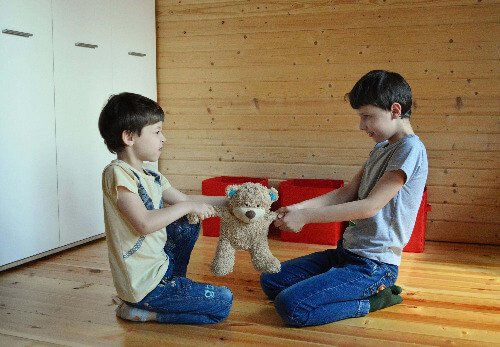Understanding Sibling Rivalry and Its Effects on Children
Sibling rivalry is a common issue in many households. As parents, we often see our children squabble, compete, and sometimes physically fight with each other.
While some level of rivalry is normal and even healthy, it can be concerning when it escalates.
What is Sibling Rivalry?
Simple really, it’s siblings fighting or competing over something, it’s a natural part of family life.
Children may fight for their parents' attention, toys, or even who gets the biggest slice of cake.
This can be frustrating, but for the most part, try to understand and help solve the issue.
Causes of Sibling Rivalry
Attention Seeking: Children crave their parents' attention and may feel neglected when they notice that their sibling is receiving more love or attention.
Individual Differences: Each child is unique, with different temperaments, interests, and abilities.
Differences like these can result in confusion and disagreements.
Competition: Kids often compete for everything, from parental approval to personal achievements.
Developmental Stages: As children grow, their needs and behaviors change, which can lead to rivalry at different stages of their development.
The Effects of Sibling Rivalry
 Sibling rivalry between two girls who do not look happy with each other.
Sibling rivalry between two girls who do not look happy with each other.While sibling rivalry is a normal part of family life, it can have significant effects on children if not properly managed.
Emotional Impact
Self-Esteem: Continuous rivalry can affect a child's self-esteem.
Feeling less favored or constantly compared to a sibling can lead to feelings of inadequacy.
Stress and Anxiety: A child living in a tense household due to ongoing conflicts can lead to them feeling anxious.
Emotional Distress: When siblings compete and clash, it can stir up emotions like anger, resentment and sorrow, impacting your child's emotional state.
Behavioral Impact
Aggression: Persistent rivalry can lead to aggressive behaviors. Children might become physically or verbally abusive towards each other.
Social Skills: Poorly managed sibling rivalry can hinder a child's ability to develop healthy social relationships outside the family.
Academic Performance: Stress and conflict at home can distract children, leading to difficulties in concentrating on schoolwork.
How to Manage Sibling Rivalry
Managing sibling rivalry involves creating a supportive and fair environment for all children. These strategies will help you to reduce conflict and promote positive relationships.
Encourage Individuality
Celebrate each child's unique qualities and accomplishments. Avoid comparisons and instead, acknowledge their individual strengths helping them feel valued for who they are.
Foster Cooperation, Not Competition
Promote teamwork by involving children in cooperative activities. Have your kids work together towards a common goal by playing a game together or better yet, doing household chores (win-win).
This builds friendships among siblings and therefore reducing competition.
Set Clear Rules and Boundaries
Establish clear rules about acceptable behavior and consequences for breaking them.
You must remain consistent and help your kids to understand the rules and boundaries that you have set and how important it is to respect each other.
Spend Quality Time
 Two boys pulling on the arms of a teddy bear, each trying to claim possession of it.
Two boys pulling on the arms of a teddy bear, each trying to claim possession of it.Make an effort to spend quality time with each child individually and on a regular basis.
Even if it’s only for a few moments of your time, it can make a difference, they will feel more secure and know that you love them.
Teach Conflict Resolution Skills
Help your children learn how to resolve conflicts on their own. Teach them to express their feelings calmly, listen to each other, and find mutually acceptable solutions.
Practicing these skills by doing a little role-playing can be effective.
Model Positive Behavior
Because children so often imitate their parents' behaviour, you could show them positive ways of handling conflicts and showing empathy.
Whatever you do it can serve as an example for your kids.
When to Seek Professional Help
While most sibling rivalry can be managed with the right strategies, there are times when it may be necessary to seek professional help.
If the rivalry becomes extreme or leads to serious emotional or physical harm, consulting a child psychologist or family therapist can be beneficial.
Therapists can offer both you and your children strategies and support to help manage your families issues effectively.
The Positive Side of Sibling Rivalry
It's important to remember that not all rivalry is bad. In fact, a child can experience positive effects from sibling rivalry.
Learning to Navigate Relationships
Through sibling rivalry, children learn important social skills such as negotiation, empathy, and patience.
It’s essential that they have these skills so that they can have relationships other than those in their family.
Building Endurance
Children will learn to build strength when having to deal with sibling rivalry.
They will need to be able to cope with the difficulties in life so that they are prepared for any challenges they may come up against in the future.
Enhancing Parent/Child Relationships
Despite the conflicts that may arise, sibling relationships are often some of the longest bonds in one's life.
By being supportive to one another and knowing how to solve conflicts, siblings can improve on their relationships.
 Okay, I couldn't help it, they are just so darn cute! Two baby bears, standing on their back legs and play fighting in the snow.
Okay, I couldn't help it, they are just so darn cute! Two baby bears, standing on their back legs and play fighting in the snow.It’s natural to experience sibling rivalry among family life, but it doesn't have to be a source of constant tension.
When you understand the causes and effects of sibling rivalry, you can teach your kids the best way to manage their relationships in positive ways.
Just keep in mind, the key isn't to completely get rid of competition among siblings, but rather to handle it in a manner that encourages growth within the family.
Be patient and remain strong, you can turn sibling rivalry into an opportunity for your children to learn, grow, and develop stronger bonds with each other.
















New! Comments
Have your say about what you just read! Leave me a comment in the box below.